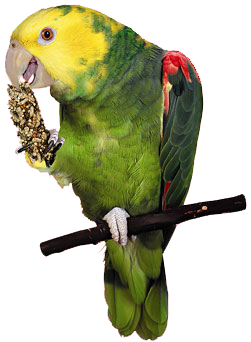|
|
Feeding Your ParrotWhat should I feed my parrot? There are entire websites that deal with this question, as well as books, DVDs, scientific studies, and so forth. We hope to offer some general guidelines and links to some great resources to help simplify it for you. There’s also a number of excellent recipes in the column to the right. Fresh Fresh FreshThe major source of nutrition for your bird should be fresh fruits and vegetables that he gets every day. These should be varied on a regular basis. Here’s a partial list of nutritious foods to give you some ideas: VeggiesLeafy dark greens (collard, mustard, spinach, beet greens etc.) FruitsStrawberries, Raspberries, Blueberries, Blackberries PelletsThere are a variety of dry “pelleted” parrot foods available at your pet store or online. Some very high quality mixes are made by Zupreem, Roudybush and Harrisons. They are blended to supply a wide variety of nutrients that your parrot needs and can be mixed into your fresh food mix or in a separate bowl for snacking. They should be considered a very necessary addition to, but not a replacement for fresh foods. Pasta and GrainsThese are foods that your bird will love! Because of their high starch and sugar content they should be given only occasionally and in limited amounts. You can serve brown rice, quinoa, or pastas made from whole wheat, and they should all be fully cooked. You can also mix in a small amount of a high quality seed mix with the fresh food, but do so very sparingly. Far too many parrots have suffered an early death because their owners fed them a diet too rich in seeds! For this same reason you should never feed a parrot wild bird food! Etc.Buy some dried beans and cook then thoroughly to add to the fresh food. Use the smaller varieties like navy, black, pinto, red, etc. The larger varieties (kidney beans and larger) should be avoided, and you should never feed your bird lima beans! Bad Foods
The following is a list of things that your parrot
should not eat
|

